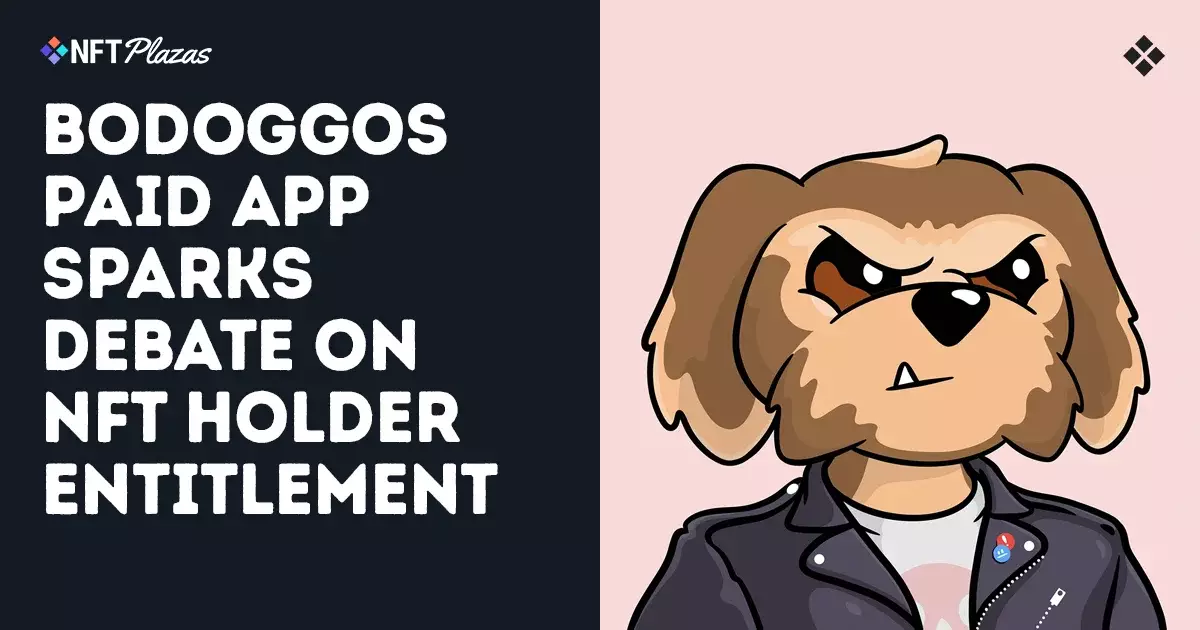The recent uproar surrounding BoDoggos and their subscription fee for a trading news app has ignited a fierce controversy in the NFT landscape. At the center of this firestorm is a tweet from user @Lewsiphur, which criticized BoDoggos for charging NFT holders access to their app, suggesting that ownership of NFTs should warrant free services. This moment provided a glaring insight into the growing divide within the NFT community; are NFT holders entitled to unlimited access to future offerings, or is it unreasonable to expect projects to thrive without some form of recurring revenue?
One cannot overlook the sheer absurdity of the situation: a community that prides itself on innovation and self-governance is now grappling with a fundamental question of entitlement. The crux of the debate rests on a simple yet critical idea: how do we balance the expectations of NFT holders with the financial realities confronting project creators? This incident is more than just an isolated issue—it encapsulates a broader trend, highlighting the flawed notion that a single investment translates into perpetual benefits.
The Burden of Expectations
Many in the NFT space, including @Lewsiphur, champion the idea that purchasing an NFT should ensure ongoing access to related products and services. They argue that early supporters of a project deserve rewards for their loyalty, and there is merit to this position. After all, early investors play a pivotal role in the success of NFT projects. Yet, as compelling as this argument may be, it is equally critical to recognize the financial burdens faced by these projects.
BoDoggos CEO Nick O’Neill made a case for the need to cover ongoing costs—employee salaries, technological infrastructure, and operational expenses—all of which are essential for long-term sustainability. The reality is harsh: businesses are built on the axiom of revenue generation. For an industry touted as a new frontier of innovation, the prevailing attitude that “one-time purchases equal lifetime entitlements” must be reassessed. If this notion persists, it may inadvertently stymie both creativity and growth in the NFT space.
A Call for Realism in Web3
Amidst the clamor, prominent figures in the NFT and broader Web3 community have chimed in, echoing a sentiment of pragmatism. Industry pioneer Leon Abboud succinctly articulated a critical point, stating that the unrealistic expectations surrounding NFT ownership are a primary roadblock to the industry’s evolution. And he is correct—businesses, including Web3 entities, must adapt in order to survive.
The skepticism surrounding BoDoggos’ monetization approach seems steeped in a romanticized understanding of what it means to be an NFT holder. The reality is that Web3 businesses operate in a complex environment requiring strategic financial planning, and many creators are navigating uncharted waters without the benefit of established frameworks. As articulated by @mattmedved, one must evoke a profound understanding of the dual challenges these projects face: rewarding loyal holders while simultaneously establishing sustainable revenue streams.
The Necessity of Open Dialogue
What stands out in this dialogue is not merely the divergent opinions, but the necessity for open discussions within the community. When community members critique project management or financial strategies, it reflects a level of investment and responsibility. This dialogue can serve as an effective catalyst for change, prompting NFT project teams to contemplate their approaches and find innovative solutions that balance both holder expectations and operational necessities.
It’s essential for members of the NFT community to engage in discussions that encompass all facets of project ownership—not just the glamorous, upside-driven elements. The concerns voiced by the BoDoggos team should not be met with dismissal; instead, community members ought to leverage these discussions as learning opportunities, recognizing that the ecosystem requires evolution rather than stagnation. As we move forward in this evolving market, a spirit of collaboration can ultimately foster solutions that benefit both creators and holders alike.
The BoDoggos controversy is not just an anomaly; it’s a pivotal moment inviting change, encouraging realistic expectations, and begging the question: how should the NFT industry redefine what it means to be part of this dynamic landscape?

